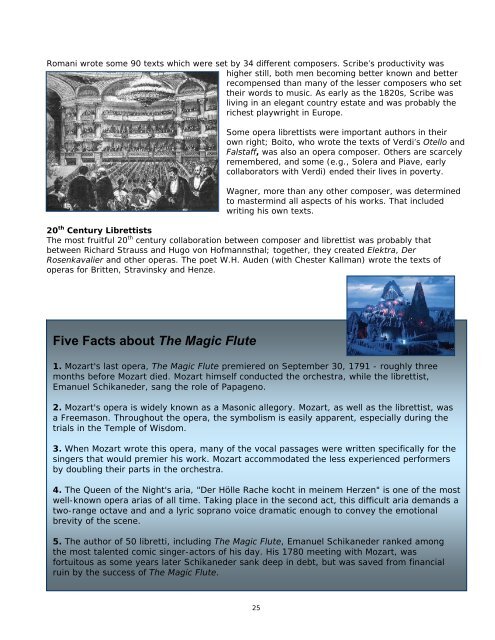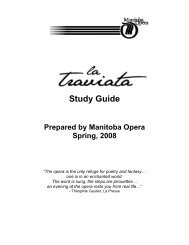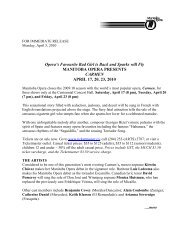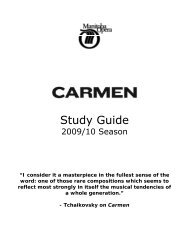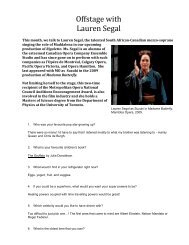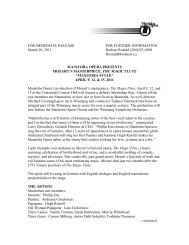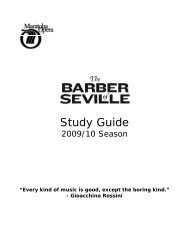The Magic Flute Study Guide - Manitoba Opera
The Magic Flute Study Guide - Manitoba Opera
The Magic Flute Study Guide - Manitoba Opera
Create successful ePaper yourself
Turn your PDF publications into a flip-book with our unique Google optimized e-Paper software.
Romani wrote some 90 texts which were set by 34 different composers. Scribe’s productivity was<br />
higher still, both men becoming better known and better<br />
recompensed than many of the lesser composers who set<br />
their words to music. As early as the 1820s, Scribe was<br />
living in an elegant country estate and was probably the<br />
richest playwright in Europe.<br />
Some opera librettists were important authors in their<br />
own right; Boito, who wrote the texts of Verdi’s Otello and<br />
Falstaff, was also an opera composer. Others are scarcely<br />
remembered, and some (e.g., Solera and Piave, early<br />
collaborators with Verdi) ended their lives in poverty.<br />
Wagner, more than any other composer, was determined<br />
to mastermind all aspects of his works. That included<br />
writing his own texts.<br />
20 th Century Librettists<br />
<strong>The</strong> most fruitful 20 th century collaboration between composer and librettist was probably that<br />
between Richard Strauss and Hugo von Hofmannsthal; together, they created Elektra, Der<br />
Rosenkavalier and other operas. <strong>The</strong> poet W.H. Auden (with Chester Kallman) wrote the texts of<br />
operas for Britten, Stravinsky and Henze.<br />
Five Facts about <strong>The</strong> <strong>Magic</strong> <strong>Flute</strong><br />
1. Mozart's last opera, <strong>The</strong> <strong>Magic</strong> <strong>Flute</strong> premiered on September 30, 1791 - roughly three<br />
months before Mozart died. Mozart himself conducted the orchestra, while the librettist,<br />
Emanuel Schikaneder, sang the role of Papageno.<br />
2. Mozart's opera is widely known as a Masonic allegory. Mozart, as well as the librettist, was<br />
a Freemason. Throughout the opera, the symbolism is easily apparent, especially during the<br />
trials in the Temple of Wisdom.<br />
3. When Mozart wrote this opera, many of the vocal passages were written specifically for the<br />
singers that would premier his work. Mozart accommodated the less experienced performers<br />
by doubling their parts in the orchestra.<br />
4. <strong>The</strong> Queen of the Night's aria, "Der Hölle Rache kocht in meinem Herzen" is one of the most<br />
well-known opera arias of all time. Taking place in the second act, this difficult aria demands a<br />
two-range octave and and a lyric soprano voice dramatic enough to convey the emotional<br />
brevity of the scene.<br />
5. <strong>The</strong> author of 50 libretti, including <strong>The</strong> <strong>Magic</strong> <strong>Flute</strong>, Emanuel Schikaneder ranked among<br />
the most talented comic singer-actors of his day. His 1780 meeting with Mozart, was<br />
fortuitous as some years later Schikaneder sank deep in debt, but was saved from financial<br />
ruin by the success of <strong>The</strong> <strong>Magic</strong> <strong>Flute</strong>.<br />
25


